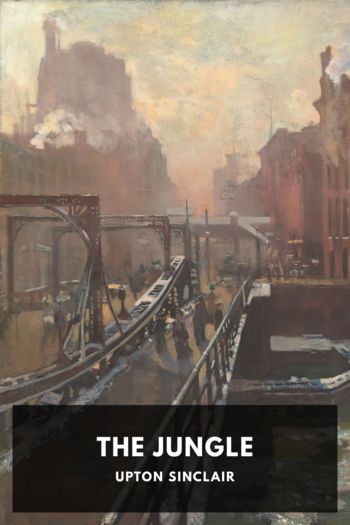Arrowsmith by Sinclair Lewis (learn to read books txt) 📕

- Author: Sinclair Lewis
Book online «Arrowsmith by Sinclair Lewis (learn to read books txt) 📕». Author Sinclair Lewis
“Gottlieb, the poor old impractical fusser! I’d like to see him swim that current!” jeered Dr. Arrowsmith to Martin.
But on night duty, alone, he had to face the self he had been afraid to uncover, and he was homesick for the laboratory, for the thrill of uncharted discoveries, the quest below the surface and beyond the moment, the search for fundamental laws which the scientist (however blasphemously and colloquially he may describe it) exalts above temporary healing as the religious exalts the nature and terrible glory of God above pleasant daily virtues. With this sadness there was envy that he should be left out of things, that others should go ahead of him, ever surer in technique, more widely aware of the phenomena of biological chemistry, more deeply daring to explain laws at which the pioneers had but fumbled and hinted.
In his second year of internship, when the thrills of fires and floods and murder became as obvious a routine as bookkeeping, when he had seen the strangely few ways in which mankind can contrive to injure themselves and slaughter one another, when it was merely wearing to have to live up to the pretentiousness of being The Doctor, Martin tried to satisfy and perhaps kill his guilty scientific lust by voluntary scrabbling about the hospital laboratory, correlating the blood counts in pernicious anemia. His trifling with the drug of research was risky. Amid the bustle of operations he began to picture the rapt quietude of the laboratory. “I better cut this out,” he said to Leora, “if I’m going to settle down in Wheatsylvania and tend to business and make a living—and I by golly am!”
Dean Silva often came to the hospital on consultations. He passed through the lobby one evening when Leora, returned from the office where she was a stenographer, was meeting Martin for dinner. Martin introduced them, and the little man held her hand, purred at her, and squeaked, “Will you children give me the pleasure of taking you to dinner? My wife has deserted me. I am a lone and misanthropic man.”
He trotted between them, round and happy. Martin and he were not student and teacher, but two doctors together, for Dean Silva was one pedagogue who could still be interested in a man who no longer sat at his feet. He led the two starvelings to a chophouse and in a settle-walled booth he craftily stuffed them with roast goose and mugs of ale.
He concentrated on Leora, but his talk was of Martin:
“Your husband must be an Artist Healer, not a picker of trifles like these laboratory men.”
“But Gottlieb’s no picker of trifles,” insisted Martin.
“No‑o. But with him—It’s a difference of one’s gods. Gottlieb’s gods are the cynics, the destroyers—‘crapehangers’ the vulgar call ’em: Diderot and Voltaire and Elser; great men, wonder-workers, yet men that had more fun destroying other people’s theories than creating their own. But my gods now, they’re the men who took the discoveries of Gottlieb’s gods and turned them to the use of human beings—made them come alive!
“All credit to the men who invented paint and canvas, but there’s more credit, eh? to the Raphaels and Holbeins who used those discoveries! Laennec and Osler, those are the men! It’s all very fine, this business of pure research: seeking the truth, unhampered by commercialism or fame-chasing. Getting to the bottom. Ignoring consequences and practical uses. But do you realize if you carry that idea far enough, a man could justify himself for doing nothing but count the cobblestones on Warehouse Avenue—yes and justify himself for torturing people just to see how they screamed—and then sneer at a man who was making millions of people well and happy!
“No, no! Mrs. Arrowsmith, this lad Martin is a passionate fellow, not a drudge. He must be passionate on behalf of mankind. He’s chosen the highest calling in the world, but he’s a feckless, experimental devil. You must keep him at it, my dear, and not let the world lose the benefit of his passion.”
After this solemnity Dad Silva took them to a musical comedy and sat between them, patting Martin’s shoulder, patting Leora’s arm, choking with delight when the comedian stepped into the pail of whitewash. In midnight volubility Martin and Leora sputtered their affection for him, and saw their Wheatsylvania venture as glory and salvation.
But a few days before the end of Martin’s internship and their migration to North Dakota, they met Max Gottlieb on the street.
Martin had not seen him for more than a year; Leora never. He looked worried and ill. While Martin was agonizing as to whether to pass with a bow, Gottlieb stopped.
“How is everything, Martin?” he said cordially. But his eyes said, “Why have you never come back to me?”
The boy stammered something, nothing, and when Gottlieb had gone by, stooped and moving as in pain, he longed to run after him.
Leora was demanding, “Is that the Professor Gottlieb you’re always talking about?”
“Yes. Say! How does he strike you?”
“I don’t—Sandy, he’s the greatest man I’ve ever seen! I don’t know how I know, but he is! Dr. Silva is a darling, but that was a great man! I wish—I wish we were going to see him again. There’s the first man I ever laid eyes on that I’d leave you for, if he wanted me. He’s so—oh, he’s like a sword—no, he’s like a brain walking. Oh, Sandy, he looked so wretched. I wanted to cry. I’d black his shoes!”
“God! So would I!”
But in the bustle of





Comments (0)